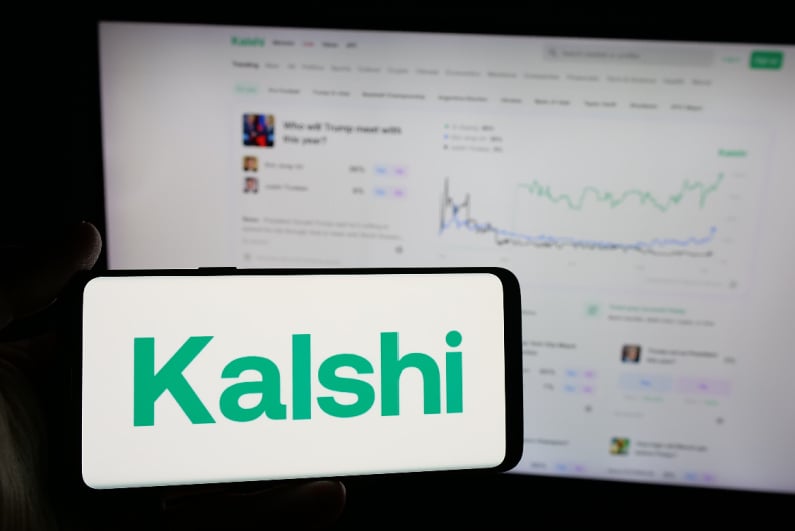Carnival barker in a bespoke suit
In the long and inglorious tradition of sportsbooks insisting they are “something else entirely,” Kalshi now finds itself painted as the latest carnival barker in a bespoke suit. According to a proposed class action lawsuit filed in the Southern District of New York (SDNY) on Wednesday the prediction market company is accused of running what is, in essence, an unlicensed sportsbook dressed up as a financial exchange. The lawsuit alleges that in September, a staggering 90% of the site’s total volume, roughly $2bn, came from sports betting dressed up as “event contracts.”
violated gambling laws, engaged in illegal deceptive activity”
Seven plaintiffs front the action, but thousands more lurk behind them, each claiming they were lured in by the promise of fairer, sharper, more transparent odds. The lawsuit seeks to recover the money punted away on the platform and demands a jury trial, with the prospect of triple damages. The complaint does not mince words, claiming that Kalshi has “violated gambling laws, engaged in illegal deceptive activity, and unjustly enriched itself at the expense of tens of thousands of consumers.”
Last September, seven-time WSOP champion and self-proclaimed “Kid Poker,” Daniel Negreanu, entered into a partnership with Kalshi, pledging to help the brand grow. To commemorate his new deal, he encouraged people to sign up for Kalshi using a special personalized promotion code, offering a $40 bonus for people who put $100 in action, revealing that one randomly chosen person would win a $30,000 package to the WSOP Paradise, including a $26,000 seat in the Super Main Event.
Trade, not bet?
Kalshi bills itself as a place to trade on the outcomes of sporting events – think a stock exchange for touchdowns and field goals – but a rose by any other name still smells as sweet. A home game host might call it a “chair fee,” but we all know that it’s rake that he’s charging. A cursory scroll through the contracts on Kalshi reveal something very much akin to your garden variety sportsbook. You can find Thanksgiving NFL winners, team-vs-team matchups, Jared Goff over/under passing numbers and plenty of other sports spot-bets.
users who thought they were engaged in a peer-to-peer game might not have been
The lawsuit takes particular aim at Kalshi’s central claim that, unlike traditional sportsbooks, users wager against each other rather than the house. According to the complaint, many of those “other traders” were actually Kalshi itself, or its subsidiaries, or its hedge fund pals like Susquehanna International Group. These entities allegedly swooped in whenever a bettor drifted too far from Kalshi’s proprietary projections, stepping up as the counterparty or, to use gambling parlance, “the house.” In other words, users who thought they were engaged in a peer-to-peer game might not have been.
The lawsuit seeks nationwide certification, plus state-by-state subclasses, citing violations of New York’s business laws, California’s unfair-competition statutes, Florida’s gambling laws, and a grab bag of other state codes. This all comes on the same week when a federal judge in Nevada tossed out an earlier favorable ruling and green-lit the state regulator to go after the company for offering what it considers unlicensed sports betting.
Prediction markets versus regulators
Kalshi is not alone in fighting regulators on multiple fronts. Prediction market hopefuls across the country are engaged in various levels of legal combat. Crypto dot com already lost a preliminary fight in Nevada, while Robinhood’s case is still grinding along with no major rulings yet. Meanwhile, DraftKings, FanDuel, Polymarket, PrizePicks, Underdog, Novig, Truth Social, Fanatics, and Coinbase all elbowing their way into the pseudo-sportsbook ecosystem.
On Thursday afternoon, Kalshi’s comms team responded to the civil lawsuit on Social Media:
Last September, Negreanu explained how Kalshi works in an exclusive interview with Chad Holloway for PokerNews. He said:
“One of my favorites is Week 1 of football. I had the Buffalo Bills against the Ravens, right? And I’m like, well, they’re dead. So, I sold half of it and took half my money back. And then I’m like, you know what? They start to come back, I’m gonna buy them again. I bought them three times and sold them three times. I ended up getting screwed because Buffalo won, which I was happy about, but you get what I’m saying. It’s just a blast. It’s super fun…This isn’t considered gambling as it’s a prediction market.”
It certainly sounded like gambling the way he described it and that is now an opinion shared by those who have brought this class action lawsuit.




